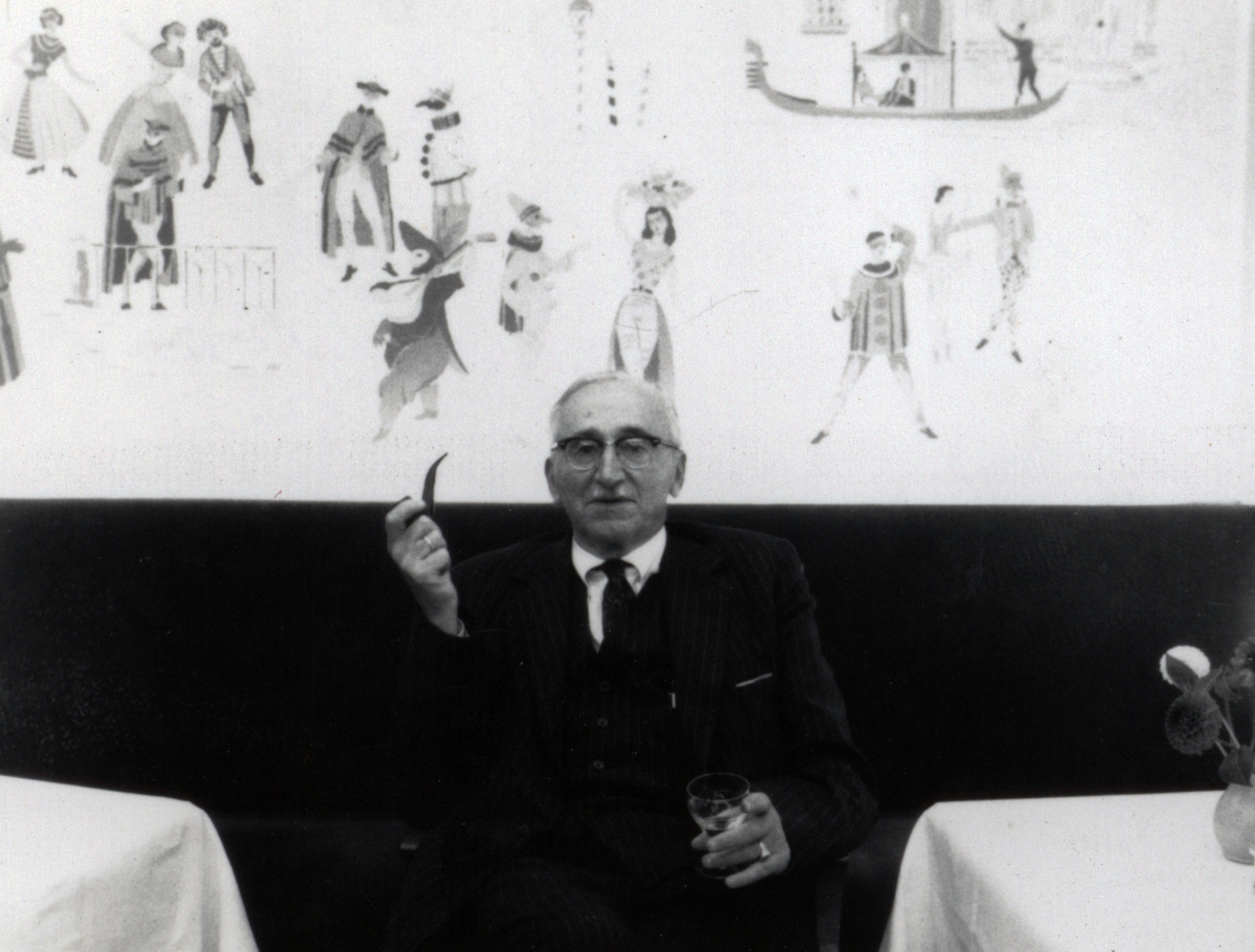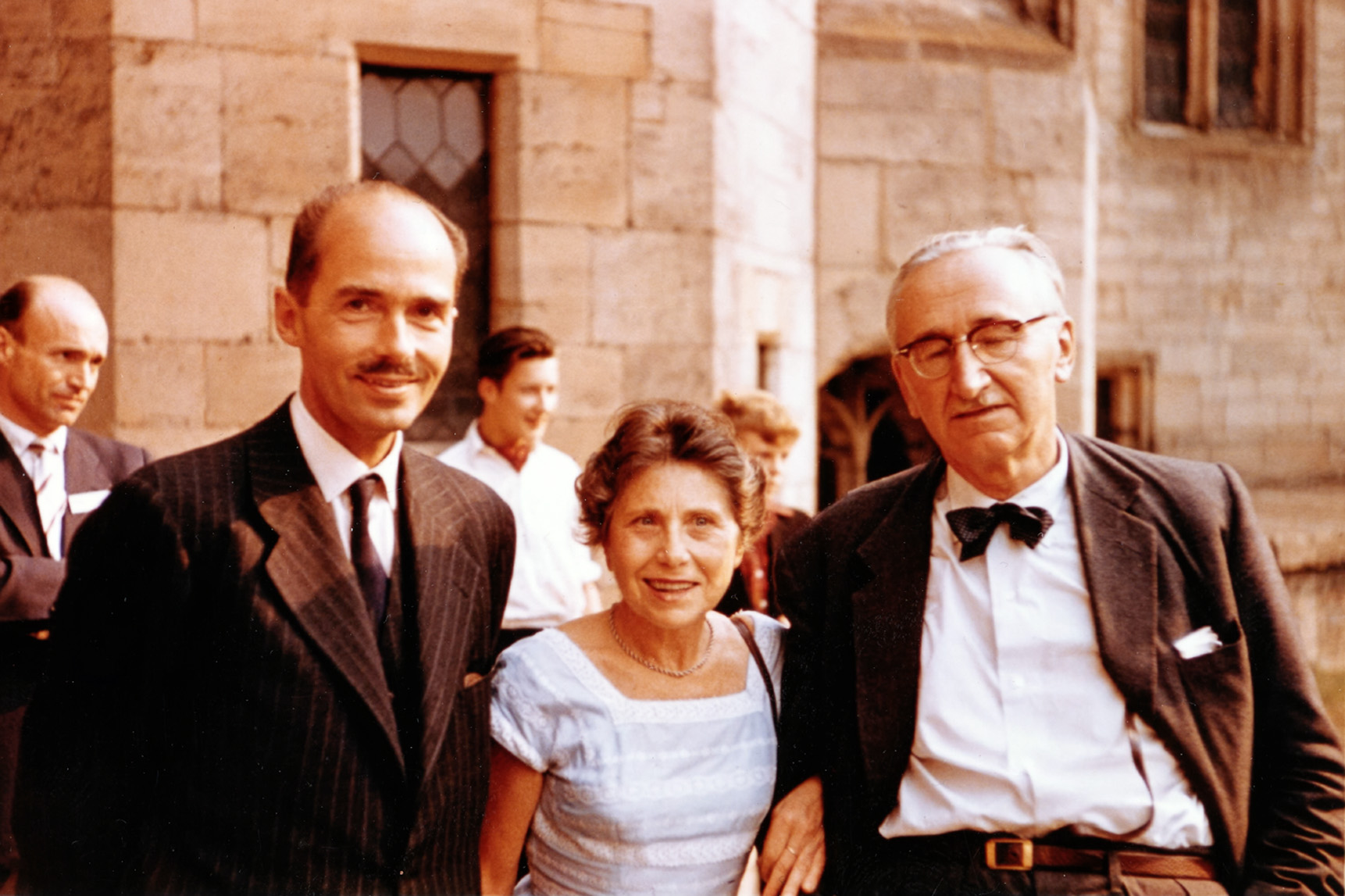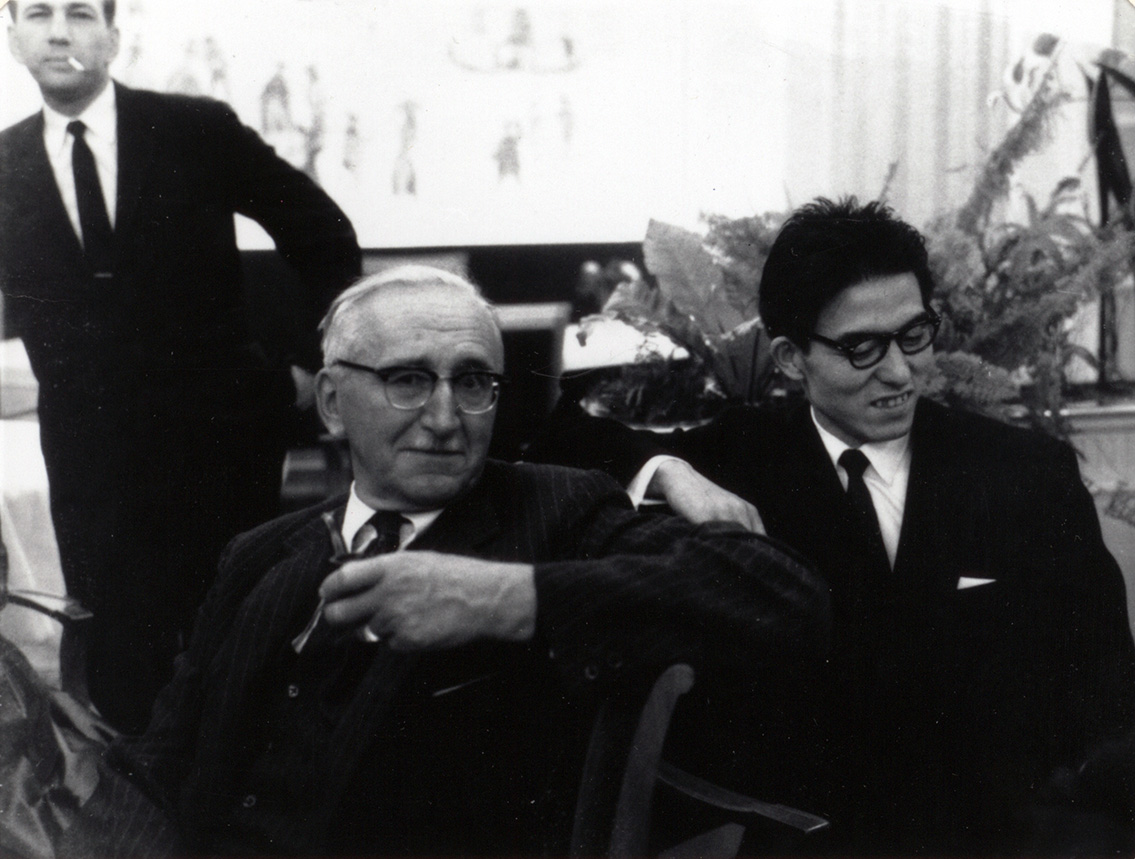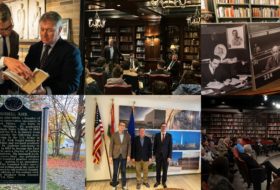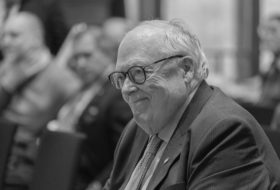Friedrich August von Hayek, 1962, Knokke, Belgium (Reference: HOAL 15A 6-9)
A few weeks ago, the well-known American weekly magazine Newsweek published a straightforward and thought-provoking opinion piece. The brief article, written by the president of a prominent conservative think tank, praises the positive effects of protectionist economic policies, most notably tariffs, arguing that such measures can stimulate domestic industries, safeguard jobs, and reduce trade imbalances. From a European—and by extension, Hungarian—perspective, it paints a rather concerning picture of the future, even though the proposed measures are primarily aimed at curbing Chinese exports. Whether the program underlying these ideas is underpinned by coherent and, perhaps more importantly, practically implementable economic considerations remains to be seen. Nevertheless, the article provides compelling evidence of how Republican positions have recently shifted from advocating for free-market principles to endorsing protectionism, along with a growing acceptance of government intervention in economic affairs.
To identify either as a Republican or a conservative—although these two concepts do not always fully overlap—does not necessarily entail embracing tariffs, quotas, or other forms of centralised regulation as effective tools of economic policy, let alone their enthusiastic advocacy. On the contrary, the emphasis on the freedom of market economies has long played a central role in shaping the identity of these political and intellectual traditions. For instance, Russell Kirk, a prominent figure in the conservative milieu of the second half of the 20th century, argued—albeit not without reservations—that the independent functioning of markets fosters the long-term expansion of individual liberty and the creation of economic prosperity. Similarly, William F. Buckley Jr., who maintained close ties with our namesake, lamented in his seminal work, God and Man at Yale, that the curricula of prestigious American universities in economics were dominated by textbooks promoting Keynesian doctrines while largely ignoring the contributions of economists advocating free-market principles. Buckley, the founder of the National Review, which served as a key forum for the American conservative renaissance, offered an incisive critique in the early 1950s. His observations were largely prescient, as the liberal economic policies he advocated only came to dominate economic thinking decades later and were eventually cemented as political practice with the rise of Ronald Reagan and Margaret Thatcher.
Otto von Habsburg, Friedrich August von Hayek, and the economist’s wife, Helene Bitterlich, during a break at the Mont Pelerin Society meeting in Oxford.
The photo was taken by Fritz Machlup in 1959. (Reference: HOAL 15A 5-33)
This transformation was symbolically encapsulated in the awarding of the 1974 Nobel Prize in Economics. The intellectual perspectives of the two laureates could scarcely have been more divergent: Swedish economist Gunnar Myrdal, a leading theorist of the welfare state and a prominent figure within the prevailing economic paradigm, stood in stark contrast to Friedrich August von Hayek, a staunch advocate of free-market capitalism. Hayek’s recognition—whether intentionally or not—heralded a paradigm shift, marking the decline of interventionist, state-driven economic policies that had long held sway. However, this shift in perspective cannot be solely attributed to the Austrian-born economist, as it was profoundly influenced by the Mont Pelerin Society, an intellectual forum that Hayek not only helped to found but also led as its president until 1961.
The Mont Pelerin Society, established in 1947 at the Hotel du Parc near Mont Pèlerin in Switzerland, was deeply shaped by the upheavals of the early 20th century. The disintegration of empires and the ascent of nationalist and authoritarian regimes fostered a turbulent intellectual environment, one that profoundly influenced the vision of its founders. Motivated by a determination to resist the encroachment of collectivist ideologies, they sought to preserve and champion the fundamental principles of individual liberty and market-driven economies. Although its members held diverse views, they were united by a fundamental conviction: that interventionist and collectivist trends posed a grave threat to the ideals of democracy, international order, the sanctity of private property, and individual freedom.
Against this background, they believed that supranational economic institutions offered a more stable and effective alternative to fragmented nation-states, which had not only failed to safeguard market freedoms and protect private property but, in extreme cases, had directly subsumed these under state control. The Society’s remarkably diverse founding membership included representatives of the Austrian school of economics and their American followers, German ordoliberal economists, key architects of the Austrian and Italian economic miracles, and prominent social scientists.
Otto von Habsburg’s staunch anti-communism and his deep interest in economic affairs naturally drew him to the Society, of which he officially became a member sixty-five years ago, in December 1959. His ties were particularly strong with the prominent figures of the later generation of the Austrian School of Economics, who played a pivotal role in shaping the organisation’s (early) character. The correspondence preserved in our Archives between our namesake and renowned economists such as Friedrich August von Hayek, Ludwig von Mises, and Fritz Machlup provides fascinating insights into their relationships. Interestingly, their exchanges spanned beyond narrow economic policy discussions, delving into broader Austrian and European public affairs. For example, in the early 1970s, Otto endeavoured, albeit unsuccessfully, to persuade Machlup—then a professor at Princeton University—to accept a nomination as head of the Austrian National Bank. These letters provide valuable glimpses not only into their professional rapport but also into their shared concerns regarding the political and economic challenges facing Europe during the mid-20th century.
Xerox Scan_20241216085629
Otto von Habsburg officially became a member of the Society in December 1959.
The official notification was signed by the then-president, Friedrich August von Hayek. (Reference: HOAL-I-2-b-Friedrich August von Hayek)
Otto von Habsburg was perfectly aware of the varied emphases within the neoliberal ideology championed by the Mont Pelerin Society—an intellectual tradition far more nuanced and multifaceted than the often pejorative connotations associated with the term in everyday discourse. He recognised that the “humanised economic thinking” of figures such as Wilhelm Röpke, as Russell Kirk aptly described it, likely offered greater advantages for fostering social cohesion than the market fundamentalism espoused by the Chicago School. At the same time, he understood that the Society provided a unique and effective platform for challenging what he described as the “arrogance of planners and bureaucrats.”
“No state can ensure economic justice if its political system does not guarantee freedom,” Otto von Habsburg declared during his address at the Society’s 1961 annual meeting in Turin, Italy. This profound insight—that political and economic freedom are inseparable—was, in fact, the key factor that forged a shared understanding between European and American conservatives and the (neo)liberal thinkers of the Mont Pelerin Society. Within the overlapping networks of these intellectual circles, we find not only Otto von Habsburg but also many of his closest allies, including the aforementioned Russell Kirk and William F. Buckley Jr.; Edwin J. Feulner, founding president of The Heritage Foundation and later president of the Society in the late 1990s; the influential American journalist Henry Hazlitt; as well as non-American figures such as the “reactionary liberal” Erik von Kuehnelt-Leddihn, and Belgian businessman Henri de Lovinfosse.
Initially comprised almost exclusively of European and North American members, the Mont Pelerin Society gradually extended its influence, evolving into a more global entity, thereby also creating new opportunities for Otto von Habsburg to expand his network. Among his most distinguished East Asian connections was Seigen Tanaka, whom he encountered through the Society. In due course, the Archduke himself played a key role in cultivating relationships across East and Southeast Asia, thereby advancing the organisation’s international expansion and augmenting its prominence on the global stage. A prime example of this was his 1962 article in the Asahi Shimbun, which introduced principles and mission of this community to a broader Japanese audience, significantly raising its profile in the region.
Japan held special significance for both Otto von Habsburg and Friedrich August von Hayek: the former heir to the throne was a frequent visitor to Japan, while Hayek, who also cultivated deep professional and personal ties within Japan’s intellectual and economic circles, prepared for his Nobel Prize acceptance speech as Tanaka’s guest in Tokyo. As our namesake noted in a letter from the early 1980s, “It is peculiar that while we live relatively close to each other, we always meet in Tokyo.”
Warren Nutter, Friedrich August von Hayek, and Aki Nanjo at a Mont Pelerin Society meeting, 1962, Knokke, Belgium (Reference: HOAL 15A 6-9)
At the Mont Pelerin Society’s 1990 annual meeting in Munich, which focused on interpreting the transformations in Central and Eastern Europe, Otto von Habsburg once again addressed the plenary session, reflecting his deep personal and intellectual engagement with the topic. However, after being elected to the European Parliament in 1979, his participation in the Society’s annual gatherings became increasingly sporadic. This was primarily due to practical reasons: the meetings often coincided with the start of the European Parliament’s autumn political season. Nevertheless, Otto von Habsburg’s two-decade parliamentary career was profoundly influenced by the principles championed by the Mont Pelerin Society, as evidenced by his speeches and policy proposals. A notable example is his stance during the renegotiation of the Lomé Convention, initially signed in 1976 to govern trade and aid relations between the European Economic Community (EEC) and countries in the Global South. In this debate, Otto von Habsburg argued against centralised solutions and the prioritisation of aid, instead advocating for strengthening the trade component. He emphasised that only trade, rather than dependency on aid, could ensure genuine economic development and preserve the sovereignty of nations in the long term.
“Only a consistent, freedom-oriented economic policy can create prosperity for all,” quoted the Frankfurter Allgemeine Zeitung in its recent editorial, referring to Ludwig Erhard, who maintained a close relationship with our namesake. As a former Minister of Economic Affairs and Chancellor, Erhard played a pivotal role in the Federal Republic’s post-World War II economic reconstruction. Like the Christian Democratic politician—who was also a member of the Mont Pelerin Society—Otto von Habsburg clearly understood that economic management should not be burdened with constant interventions. Respect for free-market principles, individual freedoms, and decentralised decision-making—whether described as the “invisible hand” or subsidiarity—could ensure lasting prosperity without the need for excessive central or state interference. Of course, there are limits to these principles, as markets do not operate independently of other social institutions. Nonetheless, adherence to these principles should not be misconstrued as an expression of liberal dogmatism or a form of globalist idolatry; rather, it represents a well-considered and legitimate conservative perspective.
Bence Kocsev
